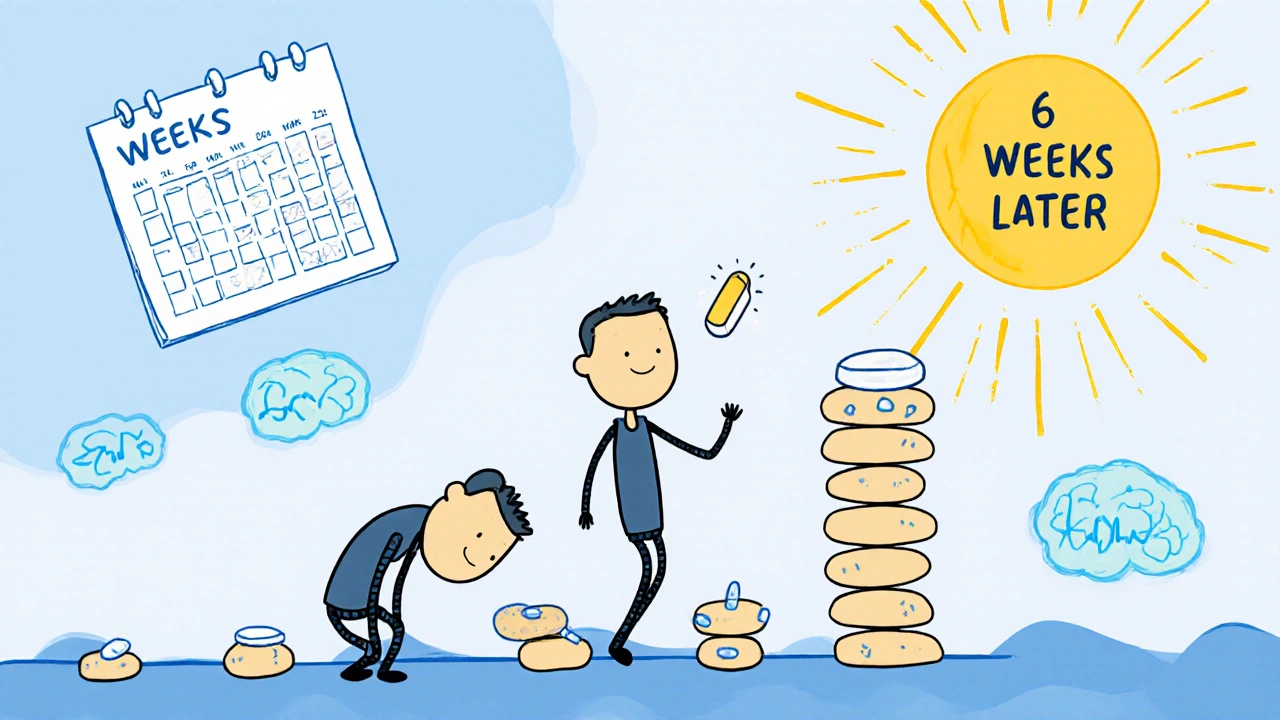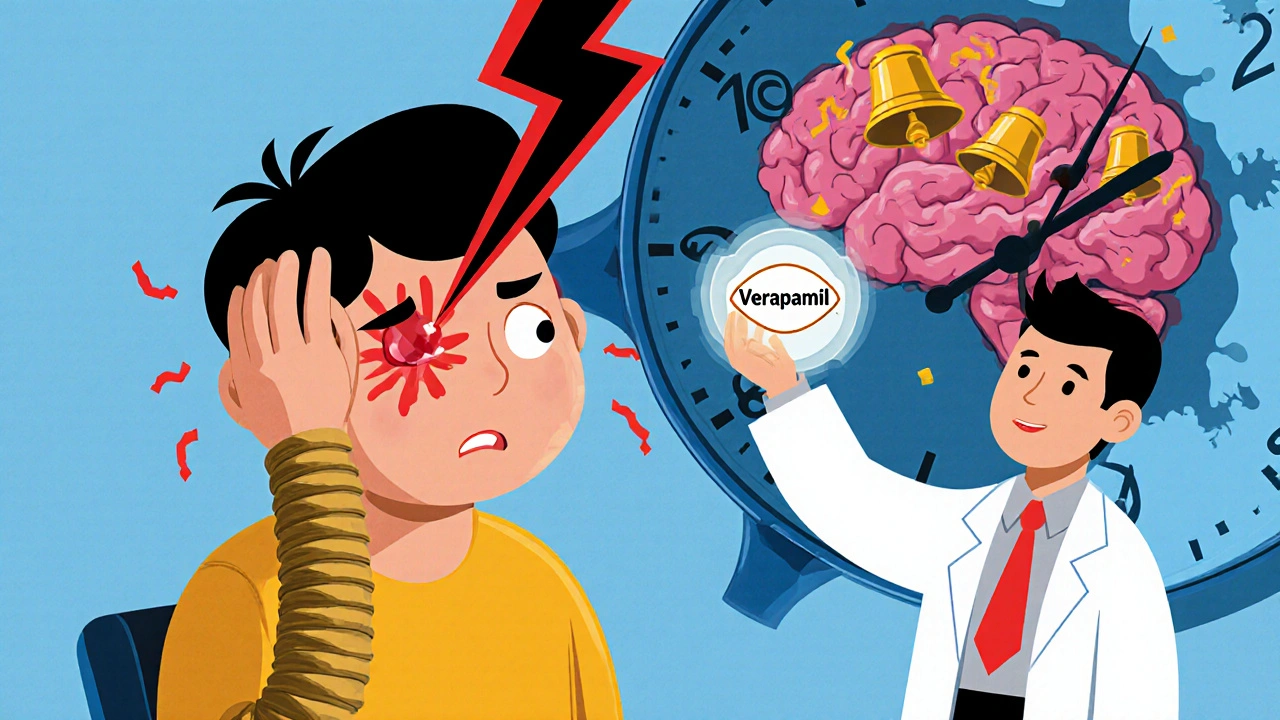Cluster headaches aren’t just bad headaches. They’re among the most painful conditions known to medicine - sharp, burning, electric pain behind one eye that can hit like a hammer and last for weeks or months at a time. If you’ve experienced one, you know there’s no hiding it. You can’t just pop a painkiller and wait it out. That’s where verapamil comes in. It’s not a cure, but for many people, it’s the only thing that stops these attacks from taking over their lives.
What is verapamil, really?
Verapamil is a calcium channel blocker. That means it stops calcium from entering the muscle cells in your heart and blood vessels. In the heart, this slows down your pulse and lowers blood pressure. But in the brain, something else happens. Researchers believe verapamil stabilizes the hypothalamus - a tiny region deep in the brain that controls your body’s internal clock. In cluster headache patients, this area goes haywire during attacks, triggering pain signals like a faulty alarm system. Verapamil doesn’t stop the pain once it starts. It stops the alarm from going off in the first place.
It’s not a new drug. Verapamil has been used since the 1970s for high blood pressure and heart rhythm issues. But in the 1980s, neurologists noticed something odd: patients with cluster headaches who were taking verapamil for heart problems had fewer attacks. That’s how it became a go-to preventive treatment. Today, it’s the most commonly prescribed medication for chronic and episodic cluster headache cycles.
How does verapamil work for cluster headaches?
Unlike triptans or oxygen therapy - which treat attacks after they begin - verapamil works in the background. It’s taken daily, even when you’re not having a headache. You don’t feel it working. There’s no immediate relief. That’s why many people give up too soon. It can take two to four weeks before you notice fewer attacks. Some need up to six weeks. If you stop too early, you’ll think it doesn’t work. But if you stick with it, the results can be life-changing.
Studies show verapamil reduces the number of daily attacks by 50% or more in about 70% of people with chronic cluster headaches. In episodic cases, it can help shorten the duration of a cluster period or even prevent it from starting. One 2023 review of 12 clinical trials found verapamil was significantly more effective than placebo at reducing attack frequency and severity. It’s not perfect - but nothing is.
Dosage: More isn’t always better
Dosing verapamil for cluster headaches is tricky. It’s not like taking an aspirin. Doctors usually start low - around 80 mg per day, split into two or three doses. Then they slowly increase it, often up to 240 mg or even 480 mg daily, depending on how you respond and how your body handles it.
Why not just start high? Because verapamil can slow your heart rate. If you’re on too much too soon, you could develop dizziness, fatigue, or worse - a dangerously slow heartbeat. That’s why your doctor will likely order an ECG before you start and again after you reach your target dose. They’re checking for changes in your PR interval - a measure of how long it takes your heart’s electrical signal to travel from the top to the bottom chambers. If it gets too long (over 240 milliseconds), they’ll lower your dose.
Some people need higher doses. Others do fine on 120 mg. It’s not one-size-fits-all. And never adjust your dose on your own. Even small changes can cause side effects or reduce effectiveness.

Side effects you should watch for
Most people tolerate verapamil well. But side effects happen. The most common ones are:
- Constipation - often mild, but can be annoying
- Dizziness or lightheadedness, especially when standing up
- Swelling in the ankles or feet
- Feeling unusually tired
- Nausea or upset stomach
Less common but serious: a slow heart rate (bradycardia), low blood pressure, or heart block. If you feel your heart fluttering, skip beats, or feel faint, get checked immediately. These aren’t common, but they’re dangerous if ignored.
Verapamil also interacts with other drugs. If you’re taking beta-blockers, statins, or certain antibiotics like erythromycin, your doctor needs to know. These can increase verapamil levels in your blood and raise your risk of side effects. Grapefruit juice? Avoid it. It interferes with how your body breaks down verapamil.
Who should not take verapamil?
Verapamil isn’t for everyone. You should avoid it if you have:
- Second- or third-degree heart block (without a pacemaker)
- Severe low blood pressure
- Heart failure with reduced pumping function
- A known allergy to verapamil
People with liver disease need lower doses because verapamil is processed by the liver. If you have cirrhosis or other liver issues, your doctor will monitor you closely. Pregnant women should only take it if the benefits clearly outweigh the risks - though it’s been used safely in some cases under strict supervision.
How long do you stay on it?
For episodic cluster headaches, you might take verapamil for just a few months - long enough to get through your cluster period and then taper off. For chronic cluster headaches, many people stay on it for years. Some take it for life.
Tapering off is important. Stopping suddenly can trigger a rebound cluster cycle. Your doctor will slowly reduce your dose over weeks, not days. Even then, some people relapse. That’s okay. It doesn’t mean the drug failed. It just means your brain still needs help staying stable.
There’s no magic number for how long you’ll need it. It depends on your pattern, your response, and your body’s tendency to relapse. Some people go years without an attack after stopping. Others are back to square one in weeks. Your neurologist will help you decide based on your history.

Alternatives if verapamil doesn’t work
Not everyone responds to verapamil. About 30% of people don’t get enough relief. If that’s you, there are other options:
- Lithium - used for mood disorders, but also effective for cluster headaches. Requires blood tests to monitor levels.
- Topiramate - an anti-seizure drug that also helps prevent migraines and cluster attacks.
- Corticosteroids - like prednisone. Used short-term to break a cycle, not for daily prevention.
- Greater occipital nerve blocks - injections that can stop attacks for weeks.
- Neuromodulation devices - like the Cefaly or sphenopalatine ganglion stimulators - non-drug options approved in Australia and the US.
Some people use a combination. Verapamil plus a nerve block. Or verapamil plus oxygen therapy for breakthrough attacks. Treatment isn’t one-size-fits-all. It’s a puzzle. And verapamil is often the first piece you try.
Real stories: What patients say
One man in Melbourne, 42, had cluster headaches for 14 years. He’d get 3-4 attacks a night, every day, for six months straight. He tried oxygen, triptans, even surgery. Nothing worked long-term. His neurologist prescribed verapamil at 240 mg daily. After six weeks, his attacks dropped from 4 a day to one every third day. He still uses oxygen when he needs it, but now he sleeps. He says, “I didn’t think I’d ever get back to normal. Verapamil gave me that.”
A woman in Sydney, 38, had episodic clusters every winter. She took verapamil for three months each year. Her attacks stopped. She didn’t have one for two winters in a row. When they came back, she restarted the same dose - and it worked again. “It’s not glamorous,” she says. “But it’s reliable.”
These aren’t rare cases. They’re the norm for people who stick with the treatment.
What to do next
If you’re considering verapamil for cluster headaches:
- See a neurologist who specializes in headaches. General practitioners rarely have the experience to manage this.
- Ask for an ECG before starting. It’s standard, not optional.
- Be patient. Wait at least four weeks before deciding if it works.
- Keep a headache diary. Note frequency, duration, and intensity. This helps your doctor adjust your dose.
- Don’t stop or change your dose without talking to your doctor.
Cluster headaches are brutal. But they’re treatable. Verapamil isn’t perfect. It’s not quick. It requires monitoring. But for thousands of people around the world - including here in Australia - it’s the difference between suffering and living.
Can verapamil stop a cluster headache attack once it starts?
No. Verapamil is a preventive medication. It works over time to reduce how often attacks happen, but it won’t relieve pain during an active attack. For that, you need fast-acting treatments like high-flow oxygen or injectable sumatriptan.
How long does it take for verapamil to start working for cluster headaches?
Most people start noticing fewer attacks after two to four weeks. Some need up to six weeks. Don’t give up too soon - it’s not a quick fix. Consistency matters more than speed.
Is verapamil safe for long-term use?
Yes, for many people. Verapamil has been used safely for decades to treat high blood pressure and heart conditions. For cluster headaches, long-term use is common - especially with chronic cases. Regular ECG monitoring helps catch any heart-related side effects early.
Can I drink alcohol while taking verapamil?
It’s best to avoid or limit alcohol. Both verapamil and alcohol can lower blood pressure. Together, they may cause dizziness, fainting, or an unusually slow heart rate. If you do drink, do so in very small amounts and only after talking to your doctor.
What happens if I miss a dose of verapamil?
If you miss one dose, take it as soon as you remember - unless it’s close to your next scheduled dose. Don’t double up. Missing doses can reduce the drug’s effectiveness and increase your risk of a cluster headache flare-up. Try setting phone reminders or using a pill organizer.
Are there any natural alternatives to verapamil for cluster headaches?
No proven natural alternatives match verapamil’s effectiveness. Some people try magnesium, melatonin, or capsaicin nasal spray, but these aren’t strong enough for most. They might help as add-ons, but they shouldn’t replace verapamil if it’s working. Always talk to your doctor before trying supplements.
Can verapamil cause weight gain?
Weight gain isn’t a common side effect of verapamil. Some people report fluid retention (swelling in the ankles), which can feel like weight gain, but it’s temporary. If you notice unexplained weight gain, let your doctor know - it could signal heart issues.
Will verapamil help if I have migraines instead of cluster headaches?
Verapamil is not a first-line treatment for migraines. While it’s sometimes used off-label for migraine prevention, it’s less effective than other drugs like topiramate, propranolol, or CGRP inhibitors. If you’re unsure whether you have migraines or cluster headaches, see a headache specialist - the treatments are very different.


Post A Comment